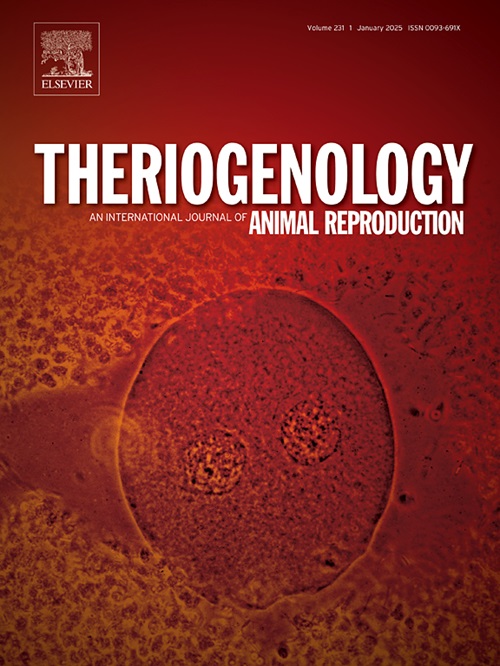基于H-Y抗原的牛X精子富集免疫分离策略
IF 2.5
2区 农林科学
Q3 REPRODUCTIVE BIOLOGY
引用次数: 0
摘要
在性预选之前,携带X和Y染色体的精子受精对畜牧业的经济影响显著。荧光激活细胞分选(FACS)是一种被广泛接受的精子分选技术,准确率超过90%。高昂的成本和对精子的潜在损害限制了流式细胞术的应用。因此,流式细胞术已被侵入性更小、更实惠的免疫方法所取代。本研究推测,针对雄性增强抗原-1 (MEA-1)肽的抗体会特异性地与牛Y精子结合,从而有助于X精子的富集。采用固体表面策略(solid surface strategy, SSS),利用纯化的IgG抗肽(MEA P-1)抗体和商业人MEA-1抗体对印度黑鲈X染色体精子进行富集。以Y染色体特异性SRY基因和X染色体特异性PLP基因为靶点,采用SYBR绿色实时荧光定量PCR法测定富集后精液样品中X、Y精子的比例。使用市售的人MEA-1抗体和抗mea P-1抗体的固体表面策略为34.72±6.74 (X: Y;73:27)和20.02±4.08 (X: Y;64:36) %的X精子富集。未分选精液和牛血液中X染色体含量的平均百分比分别为50.53±0.19和49.90±1.27,符合1:1的预期比例。使用计算机辅助精液分析仪(CASA)进行精子活力分析和低渗透肿胀(HOS)测试显示,抗mea P-1抗体治疗后精子活力可接受。该研究评估了抗肽MEA P-1抗体作为牛X精子富集的替代方法的有效性和实用性。本文章由计算机程序翻译,如有差异,请以英文原文为准。

H-Y antigen-based immuno-segregation strategies for bovine X sperm enrichment
Insemination of sperm bearing X and Y chromosomes prior to sexual pre-selection significantly impacts the livestock industry economically. Fluorescence-activated cell sorting (FACS) is a widely accepted technology that sorts sperm with over 90 % accuracy. High costs and potential damage to sperm limit the application of flow cytometry. Consequently, flow cytometry has been replaced by less intrusive and more affordable immunological methods. The present study hypothesizes that antibodies raised against male-enhanced antigen-1 (MEA-1) peptide of Bos indicus will specifically bind to bovine Y sperm, thus assisting in the enrichment of X sperm. A solid surface strategy (SSS) was employed to enrich the X chromosome-bearing spermatozoa of Bos indicus, utilizing purified IgG anti-peptide (MEA P-1) antibodies alongside commercial Human MEA-1 antibodies for comparison. A quantitative SYBR green real-time PCR assay targeting the Y chromosome-specific SRY gene and the X chromosome-specific PLP gene was conducted to determine the ratio of X and Y sperm in the enriched semen samples. The solid surface strategy using commercially available Human MEA-1 antibodies and anti-MEA P-1 antibodies yielded 34.72 ± 6.74 (X: Y; 73:27) and 20.02 ± 4.08 (X: Y; 64:36) % of X sperm enrichment, respectively. The mean percentage of X chromosome content in an unsorted semen sample and cow bull blood was 50.53 ± 0.19 and 49.90 ± 1.27, respectively, aligning with an expected ratio of 1:1. The sperm viability analysis using computer-assisted semen analyzer (CASA) for motility parameters and the hypo-osmotic swelling (HOS) test showed acceptable sperm viability post-treatment with anti-MEA P-1 antibodies. The study evaluated the efficacy and utility of anti-peptide MEA P-1 antibodies as an alternate approach for bovine X sperm enrichment.
求助全文
通过发布文献求助,成功后即可免费获取论文全文。
去求助
来源期刊

Theriogenology
农林科学-生殖生物学
CiteScore
5.50
自引率
14.30%
发文量
387
审稿时长
72 days
期刊介绍:
Theriogenology provides an international forum for researchers, clinicians, and industry professionals in animal reproductive biology. This acclaimed journal publishes articles on a wide range of topics in reproductive and developmental biology, of domestic mammal, avian, and aquatic species as well as wild species which are the object of veterinary care in research or conservation programs.
 求助内容:
求助内容: 应助结果提醒方式:
应助结果提醒方式:


